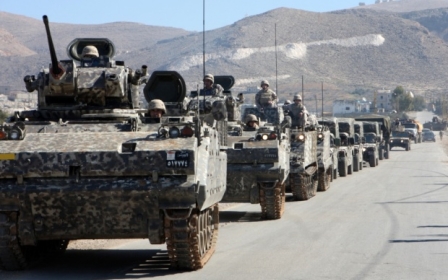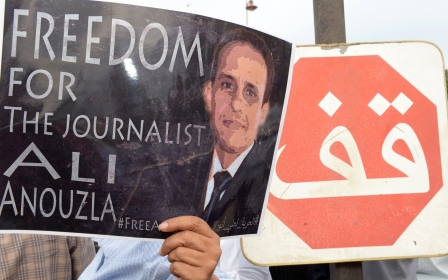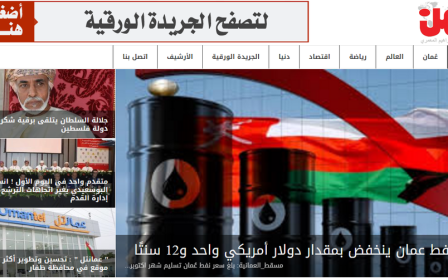Save Lebanon's press? Why not free it first

I was taking part in a panel about Lebanon’s environmental crisis in Beirut last month when an engineer, sympathetic to the Lebanese establishment, criticised me.
“You call yourself a journalist, but you aren’t naming and shaming these individuals you’re talking about right now. Why don’t you? You are a journalist, aren’t you?”
The ignoramus comment he made doesn’t take into consideration Lebanon’s lack of a truly free press, and the lack of rights I have as an unlicensed journalist.
Lebanon’s licensed newspapers and media outlets are struggling to generate revenue. Many struggle to pay their staff on time. Now the government wants to find a way to keep them from going broke.
That being said, saving Lebanon’s media goes beyond bailing out struggling newspapers and media outlets of the establishment. It’s about revolutionising what ought to be a tool and space for accountability, discussion and civic action.
The media has been hijacked and suffocated by Lebanon’s feudal-style politics, and the current crisis is an opportunity to solve the problem at its very core.
Press without freedom
Last April, Minister of Information Ramzi Jreij shared some of the discussed ideas to save Lebanon’s newspapers from going broke, including dipping into state funds for cash injections, giving corporate tax breaks, and import tax breaks on print-related materials and machinery.
While the idea of using public money to harbour a free and democratic press is something that I would support, it simply cannot happen given the current context of Lebanon’s press.
Saving Lebanon’s media goes beyond bailing out struggling media outlets. It’s about revolutionising what ought to be a space for accountability, discussion and civic action
Yes, there are plenty of active newspapers and media outlets in Lebanon, but independent and grassroots platforms that have no political, regional, or corporate financial backing remain void of any rights or support. Trying to save the press without guaranteeing a free press is asinine.
When the financial crises of several Lebanese newspapers made headlines last April, most coverage and analysis would always make sure to mention that Lebanon’s press and media laws are the freest in the Middle East.
That doesn’t say much if your neighbouring countries include Turkey, Egypt, Saudi Arabia, and Iran, all known for cracking down on journalists that cross certain boundaries. In fact, it implies that, when looking at the bigger picture, Lebanon needs complete change as well.
Article 13 of Lebanon’s constitution says that freedoms, including freedoms of expression and of the press, are guaranteed, “within the limits established by law”.
What are those limits? Nobody knows. What you publish in an article, say on television, or even post on a personal blog or on Twitter, could be interpreted as libel and slander.
If you’re a journalist with a passion for investigative work, you might find yourself in military court, just like Lebanese-Palestinian journalist Rami Aysha, who was arrested in 2013 for investigating arms smuggling across the Lebanese-Syrian border.
A new media law is needed
Lebanon’s media law, just like its political system, is archaic.
What constitutes as “press” or “media” has not been updated to suit the “digital age". The existing media law only covers television, newspapers and radio, and doesn’t differentiate between personal social media accounts, blogs and media outlets based online.
Moreover, journalists don’t enjoy what little rights and freedoms they might have unless they are registered by Lebanon’s exclusive and corrupt journalists’ syndicate.
I could be attacked, detained, or have my equipment confiscated at a protest by the police or army, simply because I do not carry a special ID
This means that people like me, an unlicensed journalist with an unlicensed platform such as Beirut Syndrome, don't enjoy the same protections as those of licensed journalists. I could be attacked, detained, or have my equipment confiscated at a protest by the police or army, simply because I do not carry a special ID.
In June, for example, I was arbitrarily detained by the Lebanese state as a bystander to an altercation. Telling the police that I was a journalist did not stop them from arresting and detaining me: I’m not a licensed journalist.
If I was a licensed journalist and was employed by a newspaper or media outlet that is either the official propaganda mouthpiece of a political party or was owned or funded by a corporate leader or regional power, the police would have immediately let me go.
Media is a symptom of Lebanon’s political crisis
The Lebanese establishment currently promotes and recognises two pillars of the country’s media. The first comprises several newspapers and media outlets that are either the official propaganda arm of political parties, or have some funding or connections to parts of the Lebanese establishment, be it directly through the political parties themselves or corporate connections.
The other pillar comprises establishment-friendly blogs: hotel, restaurant and bar reviews, silly viral content, and the occasional personal commentary on a problem within the country, without getting too politicised.
What’s missing is the third pillar that has been crushed and swept under the rug: independent, grassroots, and investigative media.
These are the journalists, photographers and concerned citizens who understand the power of journalism as a weapon that maintains democratic relationships between people and their rulers, one that spurs dialogue, conversation, and, eventually, action.
It was these unlicensed outlets that exposed (and continue to expose) police brutality, government corruption, the destruction of heritage sites, and more. They fuel the flame of democracy.
A truly free press can spur an uprising, and a political revolution that can arguably lead to the end of Lebanon’s sectarian system.
The Lebanese establishment knows this. And just like other aspects of society, they’ve made sure that the media is kept close to them. What makes Lebanon a special case compared to other countries is that the relatively pluralistic society gives some wiggle-room for certain freedoms.
Lebanon’s independent journalists, including me, aren’t hopeful about the government's attempts at reforms; we know we won’t be included.
But what keeps us hopeful are the independent journalists and outlets in Egypt, Syria and other countries that continue to do what they do despite whatever struggles they face.
Also vital are the readers, both locally and internationally, who continue to make the effort to support independent media, and understand the importance of a free press in a free society. They make the daily struggles and frustrations worth it.
- Kareem Chehayeb is a Lebanese writer and musician based in Beirut. He is the co-founder of Beirut Syndrome, a grassroots media platform. You can follow him on Twitter @chehayebk
The views expressed in this article belong to the author and do not necessarily reflect the editorial policy of Middle East Eye.
Photo: Lebanese journalists are kept at a distance from the parliament building in downtown Beirut where a roundtable national dialogue is launched by pro-Syrian parliamentary speaker Nabih Berri on 2 March 2006 (AFP)
New MEE newsletter: Jerusalem Dispatch
Sign up to get the latest insights and analysis on Israel-Palestine, alongside Turkey Unpacked and other MEE newsletters
Middle East Eye delivers independent and unrivalled coverage and analysis of the Middle East, North Africa and beyond. To learn more about republishing this content and the associated fees, please fill out this form. More about MEE can be found here.





